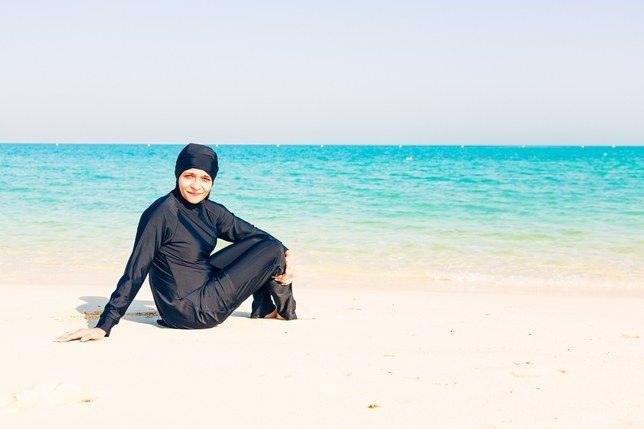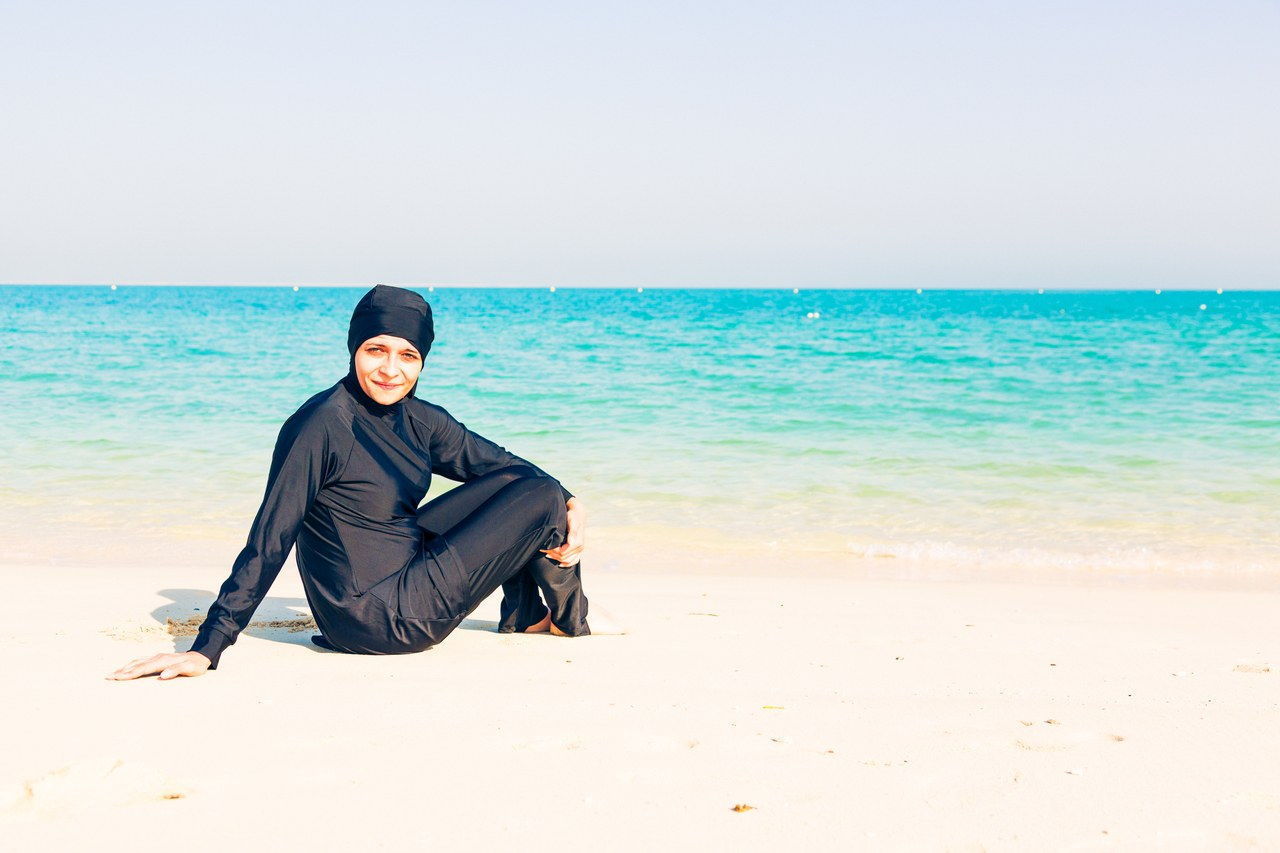“Burqini Ban” Restricts What French Muslim Women Can Wear at the Beach


If certain members of the ACCC (American Conservative Christian Coalition; a group and acronym I just made up) had its way, we might never see another itty-bitty string bikini on the shores of Miami or the cover of Sports Illustrated. The right flank of the French government, on the other hand, has decided to punish women who show up at the beaches of Cannes…not showing enough. This summer, the mayor of Cannes led a (successful) effort to ban the “Burqini”* from the beach, citing it as a symbol of Islamic extremism, likely to cause fear. This is a political issue disguised as a safety issue disguised as a fashion issue, so let’s backtrack a sec:
“The separation of church and state” is a somewhat nebulous phrase thrown into conversation when a politician or lawmaker tries, as they often do (or succeeds, as they often do), to legislate based on religion. Using the New Testament to justify, say, a ban on same-sex marriage or abortion is hardly news. But the battle between “the church” and “the state” also complicates less hot-button aspects of our daily lives. School prayer, the use of Bibles in court and the presence of the Ten Commandments in public spaces are all issues we, as Americans, have to visit again and again as our relationship to religion changes and evolves. In 2016, we take a Humanist/Protestant version of secularity for granted: Christmas is a national holiday, elected officials routinely conclude speeches with the phrase “God bless America,” and the open practice of one’s given religion—while certainly dangerous in many parts of the country—is on the whole considered an American right.
Not so in France. In France, there is a policy called “Laïcité,” a much stronger division government and religion, originally enacted over a hundred years ago to rid the French government of the influence of the Catholic Church. Almost every country in Western Europe has, at some point or another, had to renegotiate its relationship with the Vatican, so in this regard Laïcité is not remarkable. What has developed in France in the years since—and especially since the end of the Second World War—however, is. In practice, Laïcité means that there are no public expressions of religion in France. You’d never hear a French politician say “God Bless France,” and there would never be a french Kim Davis. Students are not allowed to wear religious symbols to school, ostensibly to prevent discrimination. For instance, the Jewish kids can’t be picked on if no one knows who they are. But this has, as you can imagine, created huge problems for students who don’t believe their religious observance is optional or separate form other parts of their life. Muslim girls are forced to choose between wearing their hijab and attending class, which in addition to being discriminatory, somewhat defeats the purpose of having a public education system.
While Muslims are still starkly in the minority in France (a distant second behind the eighty or so percent of France that still identifies as Roman Catholic), they are the single biggest population of Muslims in Europe. In recent years, especially since the Charlie Hebdo shooting, Bataclan massacre and Nice truck attack, a wave of anti-Muslim sentiment has allowed some French lawmakers to create even stricter rules around how Laïcité applies to Islam, and they always seem to unfairly target the way in which Muslim women dress—the most recent instance being with “Burqinis” in Cannes.
This line of reasoning doesn’t track for a number of reasons. While it’s true that some regimes around the world have used restrictive clothing to repress women, that doesn’t seem like it’s the case for women who are enjoying a day at the beach. And terrorists, to whom the mayor seems to be referring, don’t tend to be women in the first place. Certainly none of them were wearing “Burqinis” when they committed violent acts, and it’s never been used as a “symbol” of any group, ever.
The edict is also impractical. As French publications have pointed out, there’s no law against modest beachwear. Some people like to be clothed at the beach because they feel more comfortable, others to prevent skin cancer. How would a reasonable person distinguish between someone who is covering up for one of those reasons and someone who is covered for religious or cultural reasons? Under the new law, citizens in “Burqinis” will be first asked to change or leave the beach, and if they do not comply, they will be fined. Are we to expect French beachgoers to be calling in infractions? Don’t the police have better things to do than stake out a beach to catch Muslims in the act of…wearing a lot of clothing?
In America, we pride ourselves on our freedoms of speech and expression, even when what is being said or expressed is offensive to us. Similarly, France prides itself on a definitive separation between the public and religious spheres. We cannot and should not impose our value system on France. I am an American, and can only know my personal opinion on this law. But the restriction of who can take part in a recreational activity, and how they take part in it, is not what was intended by Laïcité. The law has already been condemned by those who recognize that a commitment to secular unity need not come at the cost of individual expression of culture and, frankly, the liberté for which so many French have fought.
*The Burqini is a trademarked garment manufactured by Ahiida Pty Ltd; in the law and in the media, the terms “burqini” and “burkini” are also used, interchangeably, to refer to the swim garments worn by Muslim women that cover their entire bodies. And it has an interesting history you can read about here!
WATCH: Ibtihaj Muhammad’s Mirror Monologue: “When I Look Good, I Feel Good.”

